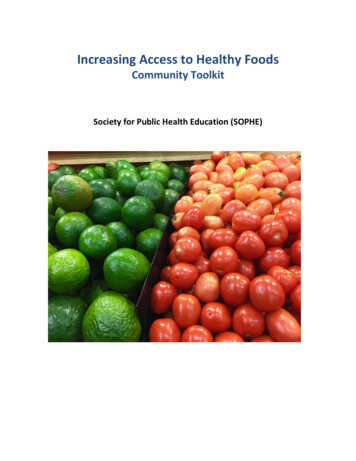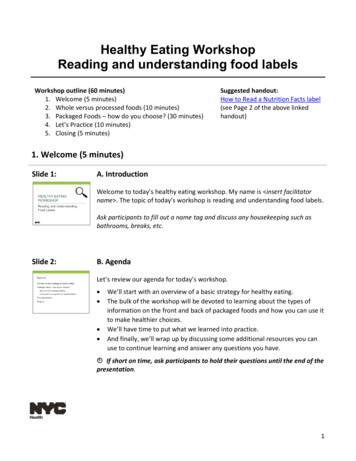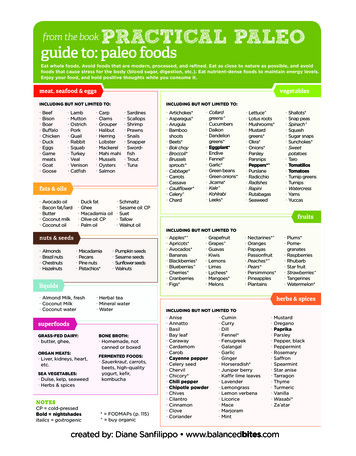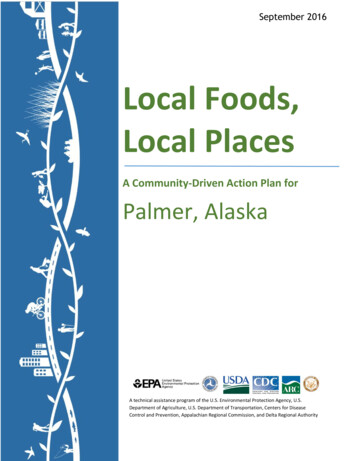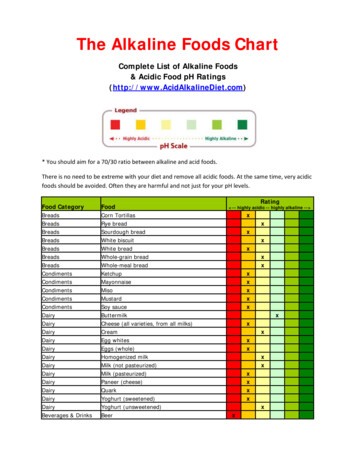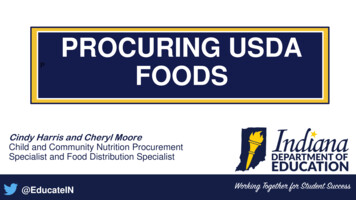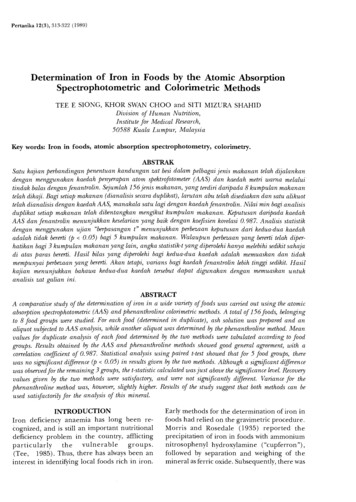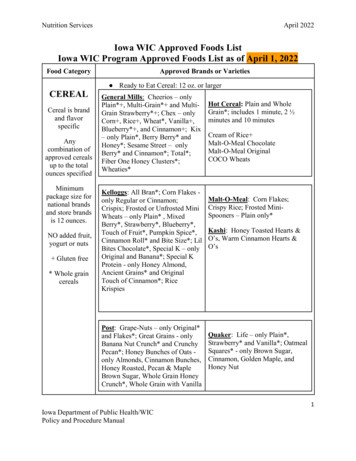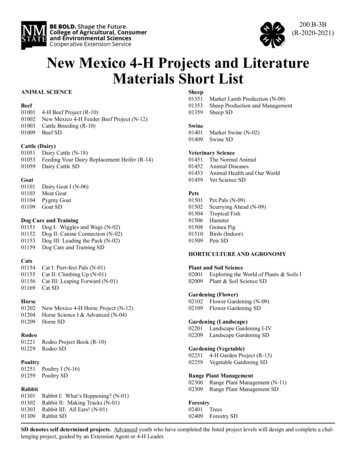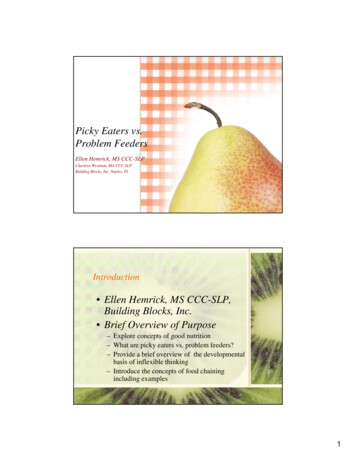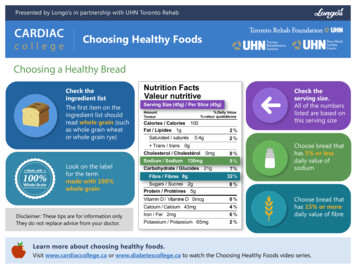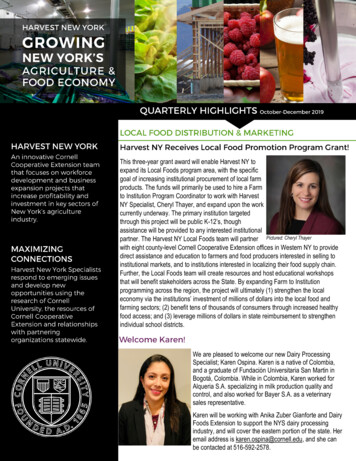
Transcription
This three-year grant award will enable Harvest NY toexpand its Local Foods program area, with the specificgoal of increasing institutional procurement of local farmproducts. The funds will primarily be used to hire a Farmto Institution Program Coordinator to work with HarvestNY Specialist, Cheryl Thayer, and expand upon the workcurrently underway. The primary institution targetedthrough this project will be public K-12’s, thoughassistance will be provided to any interested institutionalpartner. The Harvest NY Local Foods team will partner Pictured: Cheryl Thayerwith eight county-level Cornell Cooperative Extension offices in Western NY to providedirect assistance and education to farmers and food producers interested in selling toinstitutional markets, and to institutions interested in localizing their food supply chain.Further, the Local Foods team will create resources and host educational workshopsthat will benefit stakeholders across the State. By expanding Farm to Institutionprogramming across the region, the project will ultimately (1) strengthen the localeconomy via the institutions’ investment of millions of dollars into the local food andfarming sectors; (2) benefit tens of thousands of consumers through increased healthyfood access; and (3) leverage millions of dollars in state reimbursement to strengthenindividual school districts.We are pleased to welcome our new Dairy ProcessingSpecialist; Karen Ospina. Karen is a native of Colombia,and a graduate of Fundación Universitaria San Martin inBogotá, Colombia. While in Colombia, Karen worked forAlqueria S.A. specializing in milk production quality andcontrol, and also worked for Bayer S.A. as a veterinarysales representative.Karen will be working with Anika Zuber Gianforte and DairyFoods Extension to support the NYS dairy processingindustry, and will cover the eastern portion of the state. Heremail address is karen.ospina@cornell.edu, and she canbe contacted at 516-592-2578.
While conducting a soil survey spanning 21 urban vegetable farms in New York City, HarvestNew York Urban Agriculture Specialist Sam Anderson found some distinctive characteristics thatset these soils apart from many agricultural soils of New York. One common characteristic ofurban agricultural soils is relatively high soil pH, with most samples registering between 7.1 and7.5, and a few as high as 8.0. At these levels, particularly in soils with high levels of organicmatter (another feature of most urban ag soils), plant growth and yield may be negativelyimpacted. However, in the absence of any clear recommendations for how to address the issuein their unique soils, Anderson found that few NYC producers were taking steps to lower soil pH.Sulfur amendments are known to lower pH in alkaline soils, with recommended application rateswidely depending on soil type. In order to adapt these recommendations to urban agriculture,Anderson and Harvest New York colleague Yolanda Gonzalez set up a field trial, tracking thePictured: Serrano Peppers in the field trialeffectiveness of an elemental sulfur amendment for lowering pH and improving yields.They chose serrano peppers as a trial crop because hot peppers are ubiquitousacross many NYC urban farms, and because many market gardeners grow and sellserrano peppers each year to Bronx Hot Sauce, a product of Small Axe Peppers.Anderson and Gonzalez found that adding sulfur at rates of 1 or 2 pounds per 100square feet significantly lowered soil pH compared to control plots in two different soiltypes common to NYC urban farms. Yield also increased in parallel with increasedsulfur application rate; in three out of five replications, yield in plots with the higherrate of sulfur was at least twice that of the corresponding control plots, equivalent toone additional pound of peppers produced per plant. For NYC urban farmers selling toBronx Hot Sauce, this would amount to an additional 264 per 100 square feet—atthe cost of under two dollars’ worth of sulfur amendment.These results allow Anderson and Gonzalez to make educated recommendations forsulfur application rates, and at least three urban farms will be conducting their own on-farm sulfur trials in 2020.Pictured: Total peppers produced from each row of the trial,showing higher yields in plots where sulfur was addedbeforehand at the equivalent of 1 or 2 lb per 100 square feet.In New York City, growers typically sell their produce directly to their consumers throughfarm stands, Community Supported Agriculture (CSAs), as well as small grocery stores andnearby restaurants. While direct marketing sales have been profitable, urban farms inBrooklyn and Queens have not been able to enter larger retail outlets and distributors, suchas Wegmans and Fresh Direct. These market channels generally require a food safety planand some form of certification. Before Harvest NY’s presence in New York City, an urbanfarmer that wished to attend a food safety plan and Good Agricultural Practices (GAPs)training would have to travel upwards to 2.5 hours to an extension office in upstate NY,Long Island, or New Jersey.To address the need for formal food safety training and hands-on assistance for growersPictured: Sign of the new Wegmans location in the Navyin New York City, Harvest NY Specialist Yolanda Gonzalez, in partnership with theNational Young Farmers Coalition and the National Farmers Union hosted a Food Safety Yard (Brooklyn, NY)Modernization Act (FSMA) Grower training and Food Safety Plan Writing Workshop onOctober 1-2nd, 2019. Over 20 urban growers, both hydroponic and soil-based, receivedthe education they needed to meet the training requirement for GAP certification, which willultimately position them to sell to a wider range of customers.In addition to larger retail outlets and distributors, more restaurants are seeking to protecttheir food supply and reduce their risk of food-borne pathogens by purchasing fromsuppliers that have a food safety plan and have GAPs certification. According to onefarmer, “GAPs certification will also increase our ability to maintain our existing accounts,as they will have additional confidences that we are taking steps to keep our produce foodsafe.” Overall, farmers found that these valuable training opportunities helped themPictured: Participants of the FSMA Grower Training held atunderstand best practices and ways to customize these practices to best suit their unique 55 Hanson Place on October 1st, 2019 (Brooklyn, NY)farm operations—all without having to leave New York City!
Over 100 craft beverage stakeholdersgathered in Liverpool on December 16-17 forthe annual Empire State Barley & MaltSummit, the theme of which was the “Valuein Local.” The primary audience for theSummit has always been growers andmaltsters, though the conference committeestrongly encouraged breweries and distillersto attend. This Summit drew in repeatattendees and a fair amount of newattendees, which included growers,maltsters from the Northeast region,brewers, and distillers. Debuted at theSummit was a video* produced by CornellCooperative Extension Communications. Thevideo illustrates the curricular and symbioticpartnership between Cornell CALS plantbreeders and pathologists, Extensionspecialists, farmers, maltsters, and farmbrewers. When asked if the attendees wouldattend a 4th Summit in 2020, a resoundingYES was expressed by the majority.Pictured: NY Brewing Value Chain from Grower to Consumer Panel. Pictured from L-R: Francis Domoy(Domoy Farms), Ted Hawley (New York Craft Malt), Dan Palladino (Heritage Hill Brewhouse), Joe Ori (All WhoWander), Dan Chapman (All Who Wander), Paul Leone (NY Brewers Association).Pictured: David Skeval, CCE Onondaga, participates in amalt sensory exercise, led by Aaron MacLeod, HartwickCollege Center for Craft Food & Beverage. In this session,attendees dove into an exploration of malt flavor and aroma.They learned how flavor is created in the malthouse andthe potential impacts of genetics, growing conditions andprocessing, as well as how malt contributes to beer flavorand how it can be assessed.* To view the video in its entirety, visit https://youtu.be/s5ln1FoewcIIn Northern New York, there are limited available markets for local farm products. Farmers are looking to seek other optionsoutside of Northern New York. However, before jumping into finding additional markets, farmers are attending HNY educationalworkshops to prepare their operations.Harvest NY worked with the local Cornell Cooperative Extension offices to support and provide training on marketing education tofarmers across Northern New York. This support included teaching and facilitating a variety of marketing programs across theregion. These workshops focused on: Agritourism Farmer market General marketing Finding new markets Evaluating markets Developing a marketing plan Digital marketing Value-added products Industrial hempThe programs have reached approximately 97 farmers across Northern New York and have led to the participants findingadditional markets inside and outside of Northern New York.
The 4th quarter of 2019 boasted both regional and national programmingfor the Harvest NY Dairy Processing Program.In October, Harvest NY and the Dairy Foods Extension Program held a VatPasteurization and Basic Cheese course. Pasteurization is a keyregulatory concern for dairy processors. During the vat pasteurizationportion of the course, participants utilize Cornell’s Food ProcessingDevelopment Laboratory (FPDL) for hands-on learning of differentpasteurizer components and key factors for successful pasteurization.For the cheese-making portion of the course, participants have classroomtime to learn key cheese-making factors before continuing on to the handson portion of the course in the FPDL. This year, the participants madeswiss, cheddar, and farmer’s cheese. Participants are in charge of keepingtrack of the cheese’s temperature, pH, culture addition, and cutting. Duringthe process, instructors point out key things to identify for cheese quality.23 participants earned certificates in these areas after demonstratingknowledge of cheese making during this workshop.Figure 1. Map of Vat Pasteurization and Basic Cheese Course attendeesHarvest NY also partnered with Dairy Management Inc. (DMI) on hostingthe inaugural Dairy Beverage Symposium in Rosemont, IL. DMI is theNational Checkoff organization funded by the nation’s dairy farmers. TheDairy Beverage Symposium highlighted key innovations in the dairybeverage space, including: Artificial Intelligence (AI) trend prediction utilizing social and other bigdata sources The Milk Plant of the future New Farm-to-Table data analysis tools to improve the quality and shelfFigure 2. Left to Right. Hari Meletharayil (DMI: Vice President-Productlife of dairy-based beveragesResearch), Kimberly Bukowski (Cornell Dairy Foods Extension: Certificate Processing Innovation Panel - Using Milk as an ingredient to add value Program Director), Anika Gianforte (Harvest NY Dairy ProcessingSpecialist), Bill Graves (DMI: Senior Vice President- Product Research Milk's Customers of the Present and Future Paneland Food Safety) Innovation in PackagingThis national symposium was key to identifying specific focus areas for dairy beverage manufacturers. As the technology spacecontinues to advance, New York State dairy processors need to be aware of what is happening at the national level to stay aheadof the curve. Forty individuals from companies across the U.S. attended the symposium, including 5 individuals from NY.On November 14th, at Alfred State’s College Farm, Harvest NY’s berry specialistEsther Kibbe gave a workshop on strawberry and blueberry establishment andnutrition management. The workshop was organized in collaboration with LynnBliven, Agricultural Educator in Allegany County, and Ariel Kirk, Ag Educator fromSteuben County. The workshop was well attended, with 26 participants fromAllegany and Steuben County, as well as from Cattaraugus, Wyoming, Erie andMonroe counties. The class included lively discussions and practical examplesfor managing soil issues and fertility management. Most of the attendees weresmall scale or beginning growers and appreciated the focus on the fundamentals.An attendee, Chris Przemielewski, commented on the event, “Thank you forholding the class. As we always continue our education, the goal is to pick up atPhoto Credit: Oak Hill Bulk Foodsleast one significant tip or idea. I can say that I picked up several good ones!”
Fiscal Year 2019 has closed out and here are the final tallies: Direct assistance provided to 53 farms or other agricultural enterprises (see map above). Assistance provided through 415emails, texts, phone calls, on-site visits, and even a few video conferences to more distant operations. 31 projects in various stages of design and implementation, representing almost 4.7 million of investment in the upstateeconomy. Almost 100,000 of additional funds were leveraged from various state, federal, and private grants. This number willlikely rise in the coming months as grant applications are submitted and approved. The numbers here are derived from costestimates, contractor bids, or actual turnkey project costs. With the prolonged stagnation of the dairy industry, only a little over half of these projects were dairy-related – counting goats.The remainder included a cidery, greenhouses, high tunnels, farm storefronts (maple, beef), drip irrigation, and fresh vegetablepacking facilities. Not to mention an original design livestock pavilion and show ring for a County Fair Association in westernNew York. 12 monthly articles to a readership of almost 650 subscribers. Many of these articles have been picked up and reprinted inother periodicals across New York State. Co-authored an article on farmstead planning for Pro-Dairy’s The Manager(12/2019), which has an even greater distribution ( 50,000).
Summit was a video* produced by Cornell Cooperative Extension Communications. The video illustrates the curricular and symbiotic partnership between Cornell CALS plant breeders and pathologists, Extension specialists, farmers, maltsters, and farm brewers. When asked if the attendees would attend a 4th Summit in 2020, a resounding
